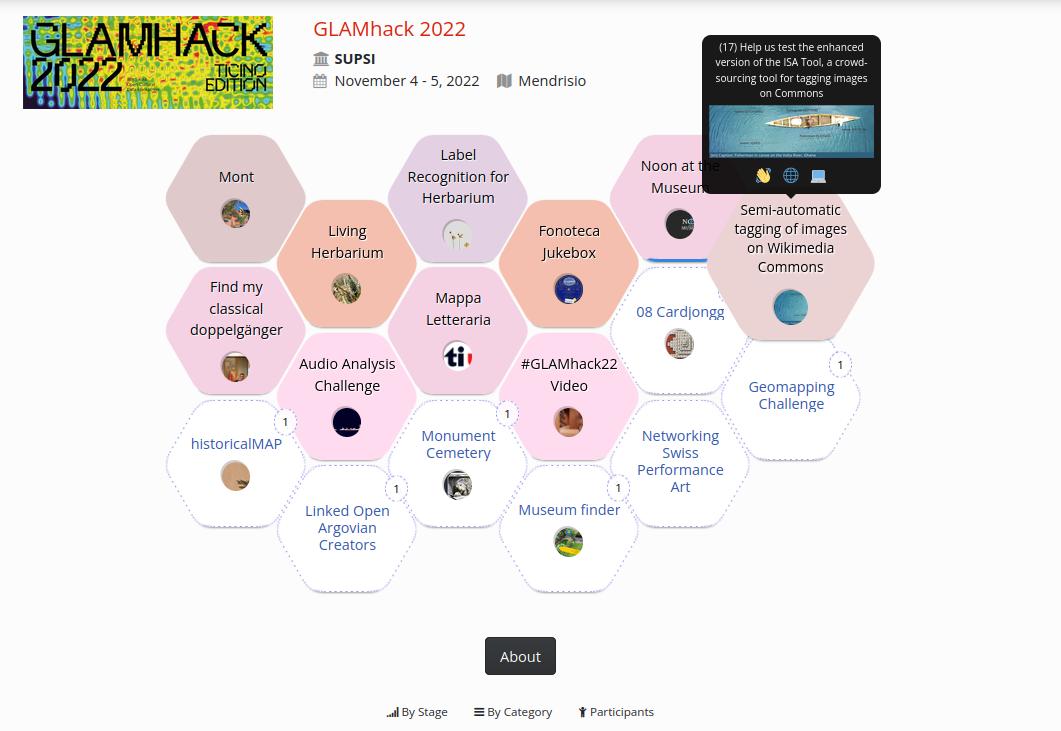Report
💡 Active projects and challenges as of 14.12.2025 09:15.
Hide text CSV Data Package Print
Dribdat
A project board for hackathons or just effective collaboration in small teams.
Tools for time-limited, team-based, open-by-default collaboration
dribdat is an open source web application that assists teams working playfully on projects with data. Designed to support awesome hackathons and promote data expeditions, it is a 🇨🇭 Swiss Army Knife for Civic Tech: your events, guidelines, count-downs, challenge board, project log, progress tracker, integrating with prototyping tools, group chat, code repositories, open data APIs, and more!

The philosophy of this project, in a nutshell, is: live and let live (no tech religion, use whatever design / dev / doc tools you want as long as they are accessible to your team), commit sustainably (aggregate outputs in standard web of data formats for optimal search and archiving), create in safe spaces (embedded code of conduct, works offline, minimal privacy footprint).
Install the software, read our Whitepaper, or try dribdat yourself at a community hackathon.

A screenshot of an event page in Dribdat.
For more background and references, see the User Handbook. If you need help or advice in setting up your event, or would like to contribute to the project: please get in touch via Discussions or GitHub Issues. You can follow and support the project on OpenCollective or Codeberg
If you use Dribdat, please add yourself to the Tour de Hack! It only takes a minute, and knowing this helps keep the 🔥 alive.
Quickstart
The dribdat project can be deployed to any server capable of serving Python applications, and is set up for fast deployment using Ansible or Docker. The first user that registers becomes an admin, so don't delay!
If you would like to run dribdat on any other cloud or local machine, there are additional instructions in the Deployment guide. Information on contributing and extending the code can be found in the Contributors guide, which includes API documentation, and other details.
See also backboard: a responsive, modern alternative frontend, and our dridbot chat client. Both demonstrate reuse of the dribdat API.
If you need support with your deployment, please reach out through Discussions.
Credits
This project is currently mantained by @loleg. See Contributors and Forks to find other users of this project.
Special thanks to the Open Data, Open Networking and Open Source communities in Switzerland for the many trials and feedbacks through over one hundred events.
This project is inspired by the work of many wonderful hackathonistas to the East, West, North, and South of here. We are grateful to F. Wieser and M.-C. Gasser at Swisscom for conceptual inputs and financial support at an early stage of this project. This application was based on Steven Loria's cookiecutter-flask, a more modern version of which is cookiecutter-flask-restful - and could be a good basis for your own hackathon projects.
Additional and ♥-felt thanks for your contributions to: Alexandre Cotting, Anthony Ritz, Chris Mutel, Fabien Schwob, Gonzalo Casas, Jonathan Schnyder, Jonathan Sobel, Philip Shemella, Thomas Amberg, Yusuf Khasbulatov .. and all the participants and organizers sending in bugs and requests! 🤗
License
This project is open source under the MIT License.
Due to the use of the boto3 library for S3 support, there is a dependency on OpenSSL via awscrt. If you use these features, please note that the product includes cryptographic software written by Eric Young (eay@cryptsoft.com) and Tim Hudson (tjh@cryptsoft.com).
API Standards Guide
Let's build a simple, accessible guide to data sharing standards
(This is a sample challenge for the GovTech Hackathon)
Goal
DCAT vs OData, REST vs RDF, Frictionless Data vs GraphQL? Developers and data publishers have a hard time making sense of the Babel's Tower of standards when it comes to metadata exchange and, after decades of evolution and competition - API technologies. With experience and hindsight, we know that some standards fit certain use cases more conditions, have various learning curves, and have slightly different conditions of reuse.
An inspiration for this from our colleagues in the Internet of Things area is the BetterIoT Assessment Tool, which helps early stage hardware startups make a strategy:

Designs
The idea would be to have a "data standards chooser" for publishers and developers, similar to the helpful License Chooser tool from Creative Commons:

Or the even simpler choose a license web page from GitHub:

References
- REST API Industry debate (Medium post)
- SOAP REST OData - What Technology When (WEM)
- Understanding gRPC OpenAPI and REST (Google Blog)
- Data Sharing Principles (GEO, screenshot below)

Data Sources
Ressourcen Open Data Hack
Open Data Portal St.Gallen: https://daten.sg.ch/
Statistikportal St.Gallen: https://stada2.sg.ch/
Open Data Swiss: https://opendata.swiss/de
Open Street Map: https://www.openstreetmap.org/#map=8/46.825/8.224 Wiki Open Street Map (Handbuch zum Export von Daten): https://wiki.openstreetmap.org/
Open Transport Data: https://opentransportdata.swiss/de/
